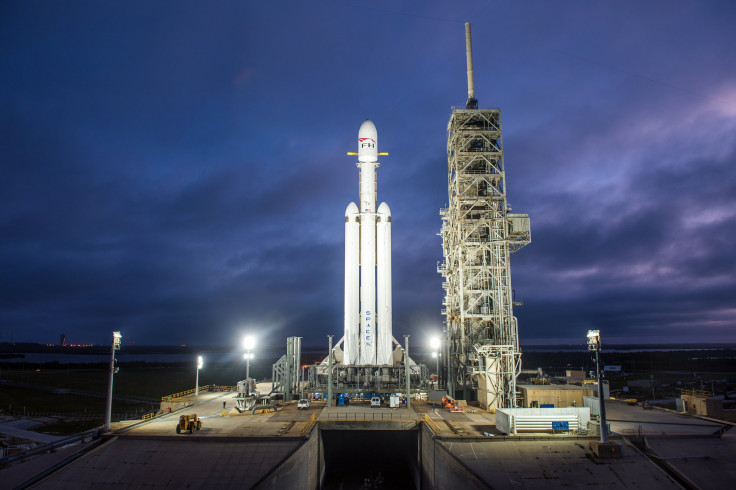SpaceX Falcon Heavy Launch On Feb 6, Elon Musk Says

We have heard it before, but SpaceX’s Falcon Heavy rocket may finally launch on its maiden flight Feb. 6. The company’s CEO Elon Musk announced on his Twitter account Saturday the latest fixed date for the much-delayed launch.
Aiming for first flight of Falcon Heavy on Feb 6 from Apollo launchpad 39A at Cape Kennedy. Easy viewing from the public causeway.
— Elon Musk (@elonmusk) January 27, 2018
Everything in that tweet except the date is already known. And this time, given everything else that is already in place, this date — the first Tuesday of February — just might be the real thing. After all, the rocket itself has been at NASA’s Kennedy Space Center in Florida since mid-December, and went vertical on its launch pad toward the end of the month.
SpaceX also performed the first static fire test of the Falcon Heavy successfully on Wednesday, following which Musk said the launch would take place “in a week or so.” He was off by about a week, but if the eagerly anticipated launch does, in fact, take place on Feb. 6, no one would be complaining.
The Kennedy Space Center Visitor Complex also started selling tickets and packages to view the launch, another indication that the event is imminent. And while Musk’s tweet says viewing from the public causeway would be easy, you should get there early if that’s what you plan to do, because large numbers are expected to show up to witness the historic launch. The best free spots are sure to be taken early.
The Falcon Heavy’s maiden mission is a trip to an orbit around Mars, where it will carry as its payload Musk’s own cherry-red Tesla Roadster, which would fittingly play David Bowie’s “Space Oddity” (though how long the power supply would keep the music up is not known). If successful, it would be the first privately built spacecraft to have gone beyond a low-Earth orbit. It would also take Musk a step closer to realizing his plan of one day colonizing Mars.
The rocket has a payload capacity of 54 metric tons, substantially more than its closest competitor, the Delta IV Heavy manufactured by United Launch Alliance — a joint venture between Lockheed Martin and Boeing. It is also almost twice as powerful as the Delta IV Heavy. The only rocket more powerful that has actually flown successfully is NASA’s Saturn V, which went to the moon.
The power that makes Falcon Heavy suitable for a distant trip, such as to Mars, comes from 27 of SpaceX’s Merlin 1D engines. The tried and tested Falcon 9 rocket uses nine of those engines, and Falcon Heavy can be thought of as three Falcon 9 cores strapped together.
But it is not as simple as just putting three Falcon 9 cores together, and there are considerable risks involved in the Falcon Heavy launch. Musk has said in the past there was a good chance the rocket wouldn’t make it to orbit, and he would be happy if Falcon Heavy flew far enough to not destroy the launch pad.
© Copyright IBTimes 2024. All rights reserved.











